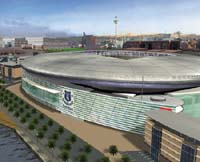ToffeeWeb Viewpoint
Good Money... Bad Money? 24 May 2003
With the demise of the Kings Dock project now a fading memory, one of our subscribers, who goes by the name of Scrote, has turned the spotlight on the role of Paul Gregg — an Everton Director who strangely has no shares in the Club itself. It seems from Scrote's piece as if Paul Gregg has become the scapegoat for a project that was doomed for a number of other reasons, the prime one being Everton's inability to come up with the £30M investment the project required. Gregg is reputed to be a businessman, not a fan of football — and certainly not an Evertonian. As soon as that provocative statement was made, somehow the man was labelled. No, more like tarred and feathered. Whatever he said or did would be treated with the utmost suspicion. The "reverse mortgage" proposal Gregg put to the Everton Board of Directors was seen by many to epitomize opportunistic entreprenurialism at Board level that goes counter to some homely image of the Family Club with working class roots in a run-down area of Liverpool... Gregg's money is bad money because he is not an Evertonian. But wait. Before he is condemned out of hand, maybe the wider role he has played in recent Everton history should be considered. He is a key investor in True Blue Holdings — the shell company he and Bill Kenwright put together to facilitate the purchase of Peter Johnson's 68% stake in Everton FC. Do not forget: this allowed his friend Bill Kenwright to nominally gain control of the Club from the evil hands of Agent Johnson. Let's look at this a moment, because I don't believe the full import of this has been brought home to Evertonians who are now so quick to question the motives of Paul Gregg. Back in 1999, Bill Kenwright needed around £20M to rescue the Club from Agent Johnson's control — remember, he was the only one of a host of suitors (depending on what story you believed) to stay the course: all the rest of the potential investors in Everton were scared off by the results of the due diligence process that showed the Club was up to its neck in debt. Only a fool... (you know the rest!). But that 'fool' was Bill Kenwright, Evertonian. We are told he put everything he had into his share of the TBH bid — around £7M. But that left him £13M adrift. Where else was he to get the money? In short, he persuaded his friends to come in with him and realize his dream. He asked them to co-invest. Paul Gregg (£7M), John Woods (£5.5M) and William Abercromby (£1.6M) put up the rest of the cash. TBH was a vehicle that enabled them to make this investment and wrest controlling interest in the Club from Johnson. Without it, Kenwright would hold only 25% of Everton Shares. With it, he controls 71% but — and this is critical for all Evertonians to remember — it would not have been possible without the commitment of his friends, Paul Gregg and John Woods. They only stand to gain, as do all investors, if the share price increases. Good Money or Bad Money? You decide. So, along comes Kings Dock. From somewhere, the expectation developed that Paul Gregg would stomp up £30M to underwrite Everton's investment — for what return? Under what conditions? Any agreement of this type was never made public but, reading Scrote's piece, you would be tempted to believe that Paul Gregg was now expected to shoulder the financial burden of Everton's investment in the project purely out of altruistic generosity. The world of business and finance simply doesn't work like that, no matter how emotional and starry eyed we may be as judgemental Evertonians. Instead, Paul Gregg came up with a scheme that sounds perfectly reasonable — were it not for the charged overtones that required Everton's "ownership" (100%? 75%? 51% 49%) of the Kings Dock project. Here was a mortgage/investment deal that worked like any other: those with the money loan it to those who don't have the money. Yet it was rejected because it did not fit the high minded promises that had been made about stadium ownership. Good money is now bad money? Is that a valid reason to condemn Paul Gregg? I don't think so.
Michael Kenrick
|

